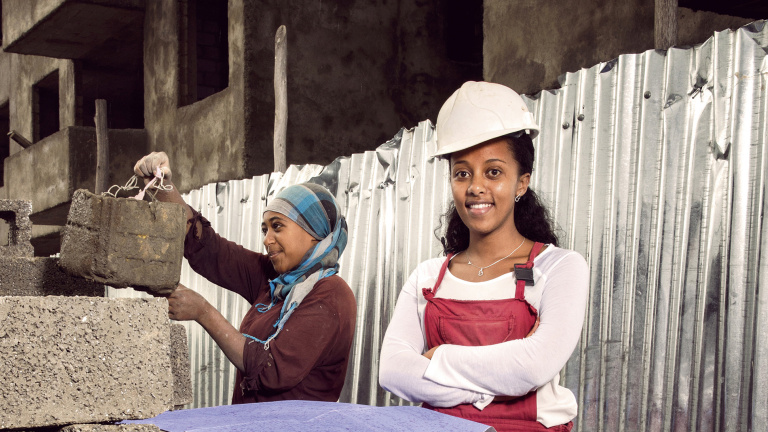
Employing ex-combatants in fragile and conflict-affected countries
While specific employment programmes have been developed to facilitate the reintegration of ex-combatants, policy makers in post-conflict societies need to give equal priority to employment programmes for both ex-combatants and ordinary civilians, bringing them together.
Youth unemployment in fragile and conflict-affected countries remains a crucial concern for the development community. However, the youth demographic is not homogenous. Ex-combatants are one group within the heterogeneous demographic of youths in societies emerging from violent conflicts. Like other youths, ex-combatants face the challenge of gaining employment after participating in armed conflicts.
Policymakers have developed disarmament, demobilisation and reintegration (DDR) programmes to address this problem. Reintegration is the strand of DDR programmes that seeks to address the problem of unemployment of ex-combatants. To achieve this, several strategies have been built into different reintegration programmes that have been implemented over time. This article sheds light on a variety of approaches that have been implemented in different post-conflict contexts.
Step approach to DDR programmes
DDR programmes have been the primary policy mechanism used to manage the transition of ex-combatants from violent conflicts to post-conflict societies. The logic of DDR programmes is that combatants should to be transformed into civilians to stop them from exhibiting destabilising violent tendencies when conflict ends. DDR can also be applied as a strategy to motivate fighters to desert their armed groups in an on-going conflict.
Disarmament focuses on “the collection, documentation, and disposal of small arms, ammunition, explosives and light and heavy weapons of ex-combatants and the civilian population” (Munive, 2016). This is followed by demobilisation, which focuses on “formal and controlled discharge of the active combatants from armed groups” (Ibid). Finally, reintegration is the process by which ex-combatants return to civilian life and gain sustainable employment and income during the post-conflict recovery period” (Ibid).
There is a consensus that DDR is an important component of post-conflict peacebuilding and economic recovery. However, reintegration, the last phase of DDR, remains a challenge. One key importance of reintegration is that it prepares ex-combatants for employment into various sectors of the economy.
Approaches to employing ex-combatants
DDR programmes have used different approaches to increase the chances of ex-combatants gaining employment, including:
Training
Training has been a core component of reintegration programmes. Training has focused in most cases on equipping ex-combatants with vocational skills in agriculture, construction, transportation, small business management and driving. New initiatives have also included formal education as part of training under DDR programmes. Formal education often focuses on facilitating the continuity of the education of ex-combatants which may have been interrupted as a result of conflict or who may have lacked opportunities to go to school even though they had the capacity.
Infrastructural development in communities
The World Bank has funded some DDR programmes that have focused on providing infrastructural development in communities. These infrastructural projects are meant to achieve the dual purpose of providing jobs for ex-combatants, as well as contributing to infrastructure in communities. This approach falls within the so-called community based reintegration (CBR) programmes. The logic of CBR is that the provision of infrastructure would ensure that non-combatants in communities are not left out of the benefits of DDR. This strategy tends to be conflict sensitive as it promotes community cohesion and create social capital in the process. For decades, policy analysts criticised DDR programmes for not paying sufficient attention to communities. However, CBR programmes are fast becoming the norm in most countries where DDR is applied.
Funding SMEs
To support the reintegration of ex-combatants, some DDR programmes have focused on providing small loans to support small-scale entrepreneurship by ex-combatants. This strategy is based on the notion that the provision of seed capital can provide the basis for ex-combatants to put their entrepreneurship skills to use. The provision of small loans has been a common practice in DDR. The outcome has been mixed. While some ex-combatants have succeeded as entrepreneurs, many others have not been able to transit from being combatants to entrepreneurs. One basic challenge here is that many programmes do not capture the challenges of becoming an entrepreneur. Although DDR programmes may provide seed capital, they often do not address the other challenges entrepreneurs face in post-conflict societies.
Cash transfers
DDR programmes also provide cash payments as part of means to facilitate the economic reintegration of ex-combatants. Although cash payments are not sources of sustainable employment, it is meant to “ameliorate the additional drain on resources experienced by receiving communities and households” (Knight and Özerdem 2004: 511). Cash transfers to ex-combatants ensure that they do have a basic income that keeps them away from crime and enable them to direct their energies towards searching for legitimate sources of employment. Cash transfer is not an employment mechanism itself. But it is meant to support the process for ex-combatants to gain employment.
Case Studies: Nigeria and Côte d’Ivoire
Nigeria and Côte d’Ivoire are countries that have recently implemented a DDR programme and have applied different strategies in facilitating employment for ex-combatants.
Nigeria
The Nigerian government designed, funded and implemented a DDR programme for armed groups in the Niger Delta region through a post amnesty programme (PAP) (Ebiede, 2016).
The DDR programme in Nigeria adopted a multi-faceted approach that includes educational and vocational training, small loans for SMEs and cash transfers to ex-combatants. The training of ex-combatants in Nigeria received priority funding. Ex-combatants received both formal education and vocational training. The training was based on a needs assessment that focused on the demands of the ex-combatants themselves. This occurred at the demobilisation camp where ex-combatants were asked about their preferred economic reintegration trajectory. The expectation was that this training would enable ex-combatants to gain employment.
Beyond training, the DDR programme in Nigeria also provided small loans for SMEs owned by some ex-combatants. The funding was not a loan, but start-up capital provided by the government without any expectation of repayment by the recipient. The Nigerian government has provided regular cash transfer of about $300 per month to ex-combatants since the beginning of the DDR process in 2009. This cash transfer is meant to provide a source of livelihood while ex-combatants search for jobs.
Côte d’Ivoire
The DDR programme in Côte d’Ivoire, supported by the United Nations (UN), has also adopted multiple approaches to facilitating employment for ex-combatants.
The DDR programme gave ex-combatants the opportunity to learn skills in vegetable farming, livestock breeding, construction, transportation and small business management. It also focused on providing apprenticeship in over 30 different trades, as well as providing on-site construction training and driving skills. The DDR in Côte d’Ivoire tend to have an emphasis on skills transfer to ex-combatants. In fact, it is clearly stated that the economic reintegration in Côte d’Ivoire is meant to give ex-combatants skills needed to participate in economic activities.
Côte d’Ivoire estimates that each ex-combatant will benefit from a reintegration package that will cost $924. The reintegration will include community rehabilitation that focuses on rebuilding public and economic infrastructure that was affected by war. This is based on the logic that the investment in public infrastructure will spur the growth of private businesses, which in turn will give ex-combatants the opportunity to put their skills to use. In essence, the economic reintegration programme in Côte d’Ivoire was based on a focus on the overall economic development of the country that has just emerged from a civil war.
Outcomes
Ex-combatants in Côte d’Ivoire and Nigeria continue to face employment challenges. The cash transfers to ex-combatants in both Nigeria and Côte d’Ivoire have proved to be an unsustainable means of income. Although it provides funds for ex-combatants, it does not necessarily guarantee that ex-combatants will be able to find jobs. The cash transfer actually tends to be a disincentive for ex-combatants in finding jobs. This is especially the case in Nigeria where the cash transfer of $300 per month is more than the minimum wage and the monthly income of workers with the same skills that DDR seeks to give ex-combatants.
The programme in Côte d’Ivoire has reported considerable success in facilitating employment for ex-combatants, but these claims remain contestable. Generally, unemployment of youths, particularly ex-combatants, continues to be a problem in both Nigeria and Côte d’Ivoire.
The benefits received by ex-combatants from DDR programmes in both countries tend to create a perception that fighting pays. This perception tends to divides youths in post-conflict societies into two basic categories: ex-combatants and others. This is an important challenge that needs to be addressed in the design of programmes that seek to provide employment for ex-combatants. Employment programmes should reduce, not broaden, the divide among youths in post-conflict countries.
Looking forward
DDR will continue to remain relevant to societies that have experienced violent conflicts. This relevance means that policies designed to facilitate the reintegration of ex-combatants will remain the policy of first instance in facilitating employment for ex-combatants. Therefore, there is a need to design DDR programmes in ways that ensure they give ex-combatants the opportunity to gain sustainable employment.
One way to do this more effectively is to carefully analyse value chains along different economic sectors prior to the design of employment programmes for ex-combatants. After such analysis, policy makers will be better informed to know where ex-combatants can add value and gain sustainable means of income in the economy.
In essence, all the approaches used in reintegration must clearly feed into an economic activity that goes beyond DDR which ex-combatants can contribute to in societies where they are expected to reintegrate.
Employment programmes for ex-combatants need to be designed in ways that do not widen the divide between ex-combatants and other youths in post-conflict societies. There is a need to ensure that DDR programmes are not seen as a reward for ‘rebellion’. For this to happen, governments and institutions in post-conflict societies need to give equal priority to employment programmes for both ex-combatants and ordinary civilians. It may also be beneficial to design and promote economic programmes, especially those that focus on creating jobs that bring ex-combatants and ordinary civilians together.
References
Ebiede, T.M. 2016. The challenge of economic reintegration of ex-militants in Nigeria’s Niger Delta. GREAT Insights Magazine, 5:1. February 2016.
Knight, M. and A. Özerdem. 2004. Guns, camps and cash: Disarmament, demobilization and reinsertion of former combatants in transitions from war to peace. Journal of Peace Research, 41(4), 499-516.
Munive, J. 2016. Beyond Disarmament, Demobilisation and Reintegration of Ex-Combatants. Sustainable Security.
About the author
Tarila Marclint Ebiede is a PhD researcher at the Centre for Research on Peace and Development (CRPD), University of Leuven, Belgium. He is a former Young International Professional at ECDPM.
Read the full magazine issue





